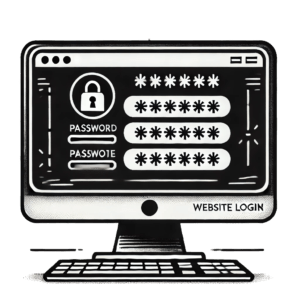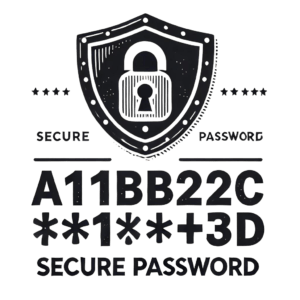Understanding Password Brute Force Attacks

In simpler terms, a password brute force attack happens when a hacker constantly tries all possible password combinations until they find the correct one. It’s like trying every known key on your front door until one unlocks it.
This can be very dangerous as it might openly expose your private information or even give someone unauthorized access to your important accounts. To keep your accounts safe, it’s a good idea to use unique, long passwords that include a mix of letters, numbers, and symbols.
Also, using a feature that asks for additional proof of who you are, like multi-factor authentication, can add another layer of security. By understanding how these online attacks work and by taking steps to secure your accounts, you’ll greatly increase your safety on the internet and protect yourself from potential threats.
Importance of Password Security
In today’s digital world, it is crucial to have strong password security to protect your online accounts. Cybercriminals are always coming up with new ways to try to guess passwords and access accounts without permission. To keep your sensitive information safe, it’s important to defend against these attacks. You can do this by creating passwords that are hard to guess, using methods like two-step verification, and changing your passwords regularly. By taking these steps, you can reduce the chances of cybercriminals getting into your accounts and keep your personal information secure. Remember, having strong password security is the best way to keep yourself safe online.
Signs of a Brute Force Attack
Multiple Failed Login Attempts
In the world of internet safety, protecting your online accounts from repeated password guessing attempts is very crucial. Cybercriminals use this technique by trying different password combinations to gain illegal access to your private information. You can prevent this by making your password strong, using a system that requires more than one method to confirm your identity, and keeping an eye on any unusual login attempts. By taking steps to improve your security and staying alert against any unusual sign-ins, you can really reduce the chances of your password being guessed and protect your personal data from harmful online criminals.
Slow System Performance
To keep your accounts safe from hackers trying to guess your password, it’s important to keep an eye on how your system is running. If your computer suddenly slows down, it could mean someone is trying to break into your account. By quickly fixing any issues, you can stop hackers from getting into your accounts and stealing your personal information. Creating strong passwords, locking your account after too many wrong login attempts, and using extra security measures like security questions can make it harder for hackers to guess your password. Checking on your computer regularly and watching out for anything suspicious can help keep your accounts safe from cyber attacks.
Unexpected Account Lockouts
Account lockouts can happen when someone tries to log into your account over and over with different passwords, usually to steal your information. To protect yourself, make sure to use strong passwords and turn on two-step verification. Check your accounts regularly and set up rules to lock them if something seems fishy. By keeping an eye out and taking steps to keep your accounts safe, you can reduce the chances of being locked out because of a hack.
Best Practices for Password Protection
Password Complexity
It’s important to have strong passwords to keep your accounts safe from hackers trying to guess your password. To make your passwords more secure, mix uppercase and lowercase letters, numbers, and special characters. Don’t use easy-to-guess information like your name, birthday, or common phrases. It’s best to have different passwords for each account and change them often to prevent anyone from getting into your accounts without permission. By focusing on making your passwords complex, you can better protect your accounts and keep your personal information safe from hackers.
Use of Two-Factor Authentication
In today’s world where everything is online, it’s important to protect your accounts from hackers trying to guess your passwords. Two-factor authentication is a way to make your accounts even more secure by asking for a second form of verification, like a code sent to your phone, along with your password. This makes it much harder for someone to break into your accounts, even if they know your password. Using two-factor authentication helps keep your personal information safe and gives you peace of mind knowing that your accounts are well protected. Don’t wait until it’s too late – stay ahead of hackers by using this essential security feature.
Password Management Tools
Keeping your passwords safe is very important to protect your online accounts from being hacked. Using password management tools can help you create strong, different passwords for each account, making it tough for hackers to guess them. These tools also securely store and fill in your passwords for you, making it less likely for scammers to trick you into giving them away. By changing your passwords often and adding an extra layer of security like two-factor authentication, along with using password management tools, you can greatly improve the safety of your online accounts and stop unauthorized access.
Countermeasures against Brute Force Attacks
Account Lockouts
Account lockouts help protect your accounts from hackers trying to guess your password multiple times. If someone tries too many times and fails, the account gets locked for added security. This makes it much harder for hackers to break into your account without permission. By using account lockouts, you can reduce the risk of password guessing attacks and make your accounts more secure. It’s important to have strong passwords and use account lockouts to keep your online accounts safe.
CAPTCHA Challenges
When it comes to protecting your accounts online, CAPTCHA challenges are really important. They help stop computer programs from guessing your password by making users prove they are real people. This is done by solving puzzles like reading distorted text or picking out certain pictures. By using CAPTCHA challenges, websites can make it much harder for hackers to break into your account. Adding this extra security measure can help keep your information safe and prevent unauthorized access. Stay safe online by using strong CAPTCHA challenges.
Network Monitoring Tools
Protecting your accounts from hackers trying to guess your password is important. To do this, you need to use special tools that monitor your network activity. These tools help you see if there is any strange activity happening that could mean someone is trying to guess your password. By watching for things like too many failed login attempts, these tools help you find and stop potential threats before they become serious. Having good network monitoring tools is key to outsmarting cybercriminals and keeping your important information safe.
Role of Awareness and Education
Protecting your accounts from hackers trying to guess your password is important for keeping your information safe. By making sure people know how to create strong passwords and understand why it’s so important, we can lower the chances of someone breaking into our accounts. Teaching people about smart password habits, like using more than one way to verify their identity and changing their password often, can help them stay one step ahead of hackers.
Additionally, having training sessions and practicing fake phishing attacks can help employees spot and avoid common tricks used by cyber attackers to steal login information. By investing in cybersecurity awareness programs and ongoing education, businesses can foster a culture of security that highlights the importance of using strong passwords to prevent password-guessing attacks.
Protecting your accounts from password attacks is important for keeping your information safe. To do this, it’s essential to keep your systems updated, watch for suspicious activity, and regularly update your passwords and software. These steps help prevent hackers from accessing your accounts and stealing sensitive information. It’s also a good idea to use strong passwords and enable multi-factor authentication for added protection. By staying proactive and following these practices, you can decrease the chances of unauthorized access to your accounts.
